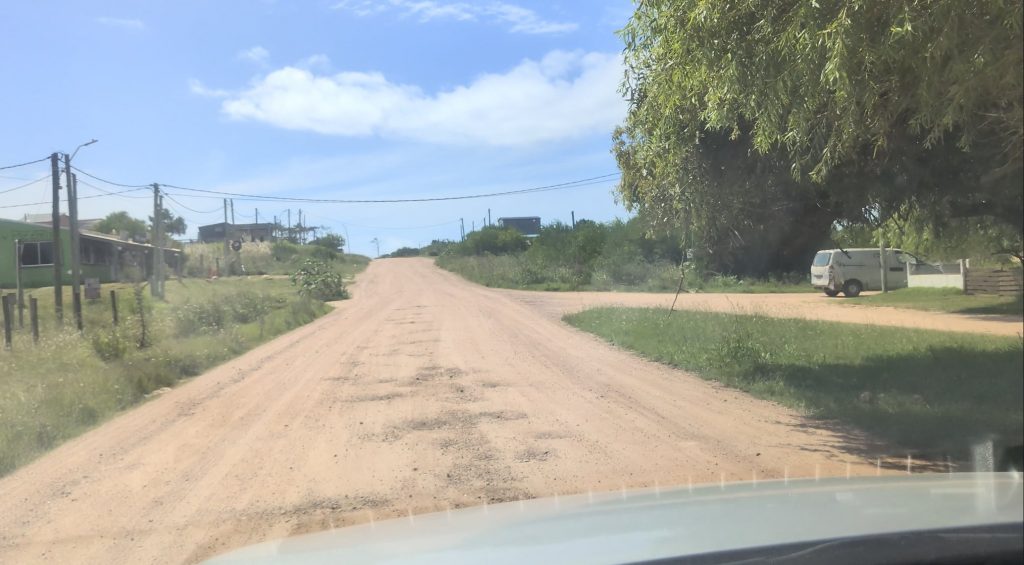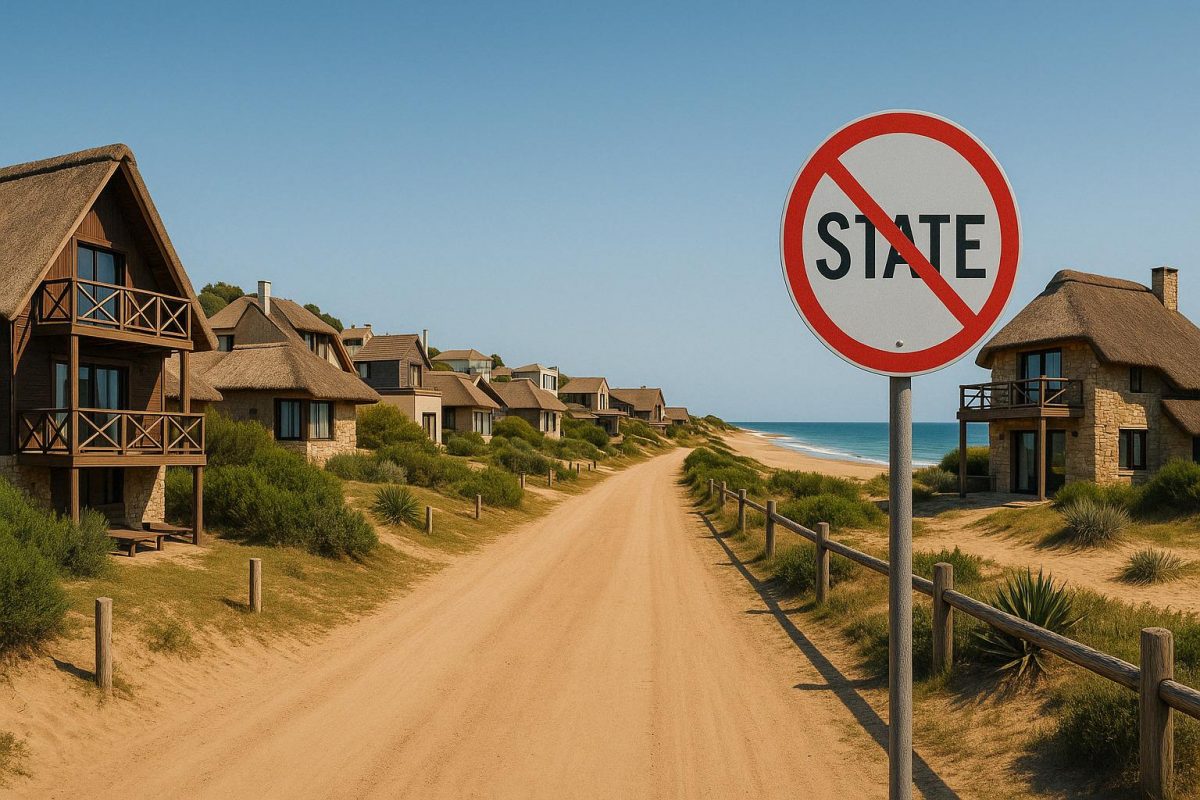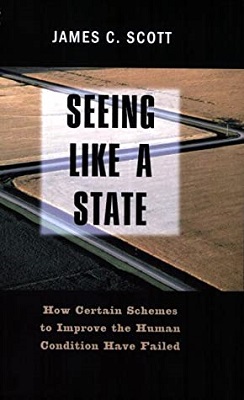How I realized that perfect infrastructure can be a sign of irrational waste of resources.
Potholes as Evidence of Reason
Imagine entering a coastal village. The sandy roads are dotted with holes. And in the midst of it all, the navigation announces: “Pothole reported ahead!” This is exactly what happened to me in a small beach village in Uruguay. Of course, I started laughing at first, since I had been avoiding holes for the past few minutes while driving. I was wondering whether the correct reaction was to click that there was no pothole there or, on the contrary, to report all of them 😅

Another thought that crossed my mind – “Hey, there’s no state here!” After all, we all know that the basic duty of the state is to build the roads! At least that’s what all good statists repeat to us over and over again when we try to explain the benefits of a society with minimal government. “But who would build the roads?!” comes their horrified cry.
But then I looked around and realized – this is not a poor country. Quite the opposite.
(The road to the village, by the way, was on an almost perfect highway, whic. I passed through several toll gates and paid normally for using the highway).
Uruguay – The Switzerland of South America
Uruguay is among the most developed countries in South America. It’s a place often called “the Switzerland of South America” – not for mountains, which it lacks, but for stability, prosperity, and quality of life. In style and atmosphere, it resembles Europe more than what would be the typical archetype of a Latin American state.
Compared to most European Union countries, Uruguay has a similar standard of living, even surpassing us in some indicators. The average Uruguayan has a pleasant life, good education, and access to modern healthcare.
But those roads! Those roads are often… imperfect. And yet people here live happily.
A Village Without Stress and Traffic Signs
Continuing along the road, I see that people (not just behind the wheel) are smiling, relaxed, nobody is in a hurry. During interactions with people, I found that no one complained about the holes in the road. Or that the roads are unpaved. Cars drove slowly, pedestrians walked around, everyone was looking out for each other and letting each other pass with a smile.
“Maybe it’s because of legal marijuana,” I thought. Uruguay is known for its progressive policy in this area. But no, that wasn’t it. You couldn’t smell the characteristic Amsterdam aroma of joints on every corner. It was simply a different lifestyle – less stress, less obsession with perfection.
Statism and Roads
Hans-Hermann Hoppe in his book “Democracy: The God That Failed” mentions an interesting phenomenon – states systematically overproduce roads.
“…in order to be able to intrude on its subjects’ private property so as to tax them, a government must invariably have control of existing roads, and it will employ its tax revenue to produce even more roads to gain even better access to all private property qua potential tax source. This over-production of roads does not result merely in the innocent facilitation of interregional trade—a lowering of transaction costs—as starry-eyed economists would have us believe but leads to forced domestic integration (artificial desegregation of separate localities).”
-H. Hermann Hoppe: Democracy: The God That Failed
Why? For two main reasons:
- They like to show off – look how we take care of you! New road, new bridge, new railway!
- They need to reach their subjects – it’s hard to collect taxes from someone you can’t reach
It’s a brilliant mechanism – the state builds you a road with your money so that it can then use that road to get to you and collect more money from you! And you’ll even be grateful for having such a nice new road.
In today’s context, of course, taxation occurs more through surveillance systems and electronic money rather than having an official come to see us and rob us manually. But a tax inspector can get to a remote mountain cabin more easily by road than with a backpack – and if they get thirsty after a day-long journey for their tax victim, they’ll welcome even untaxed unpasteurized milk.
James Scott: Seeing like a state
A book recommendation that describes exactly this phenomenon – the emergence of surnames, addresses, mapping of territory for the purpose of increasing tax collection. And how parents gave children the same first names to protect against the collection of “head taxes” or sent tax collectors to the wrong places so they wouldn’t find fields from which they could obtain crops as tax.
Meanwhile, our statist friends are happily rubbing their hands: “See, without the state we wouldn’t have roads!” As if the private sector had never built any infrastructure, which is, of course, historically nonsense.
European Obsession with Newness
We Europeans have a strange fetish – everything must be new, perfect, without a single flaw. Roads without potholes, toilets that shine with newness, bridges like from a catalog. A ten-year-old car is already unusable and wouldn’t pass inspection, so we’d rather replace it with a new one.
In Slovakia, the INESS institute calculated that in many cases it would be cheaper to transport people by private taxis at market prices than to operate some railway lines! Of course, this applies if we were to count all costs, not just the price of tickets, which is subsidized. Most of slovak railway lines are deeply unprofitable.
In Uruguay, similar to many other parts of North and South America, they have a different approach – they use things as long as they work. They don’t replace them just because they could have newer ones. It’s a more rational approach – if a toilet serves its purpose, why throw it away?
What You Don’t See When You See a New Road
When you admire a new highway or high-speed railway, do you think about what you paid for it?
Economists call this “opportunity costs” – what you could have had if you had used those resources differently. Maybe better food. Maybe better schools. Maybe more time with family because you wouldn’t have to work so much to pay taxes.
Ludwig von Mises in his book “Bureaucracy” explains why bureaucratic decision-making can never fulfill people’s preferences. An official has no incentive to save – on the contrary, the more they spend, the bigger budget they’ll get next year. But that’s the smaller problem. Mises points out that due to the absence of decision-making about the use of scarce resources, there is no information system that would convey the signal “the pothole in front of my house doesn’t bother me that much, now we need to fix the playground.” The state (or municipality) collects taxes and the decision is therefore made by an official who has no way to obtain this information. They could, of course, ask, but that’s an unnecessary extra step – it’s enough to let people keep their money and see if they repair the pothole or the playground. Or buy some alchohol, which reportedly dispels frustrations over potholes in most cases (I don’t know, I don’t drink alcohol and I don’t have frustration over potholes).
In the market, it’s different – if you voluntarily pay for something, it means you want it more than anything else you could buy with that money.
“But then, no one would fix the potholes, of course everyone would want something else!“. Exactly, that’s my point. Don’t fix the potholes, if people want something else more!
When “Lack” is a Sign of Wealth
In that Uruguayan village, I understood something important – broken infrastructure doesn’t have to be a sign of poverty. It can be a sign of rational decision-making.
Those people decided they don’t need perfect roads. What they have is enough for them. They’d rather invest their resources in other things – in homes, in food, in social life, in leisure time.
The result? Higher quality of life. Less stress. Greater satisfaction.
So next time you see a hole in the road, don’t automatically start lamenting the decline of our society. Maybe it’s not a sign of poverty, but a sign of reasonable management of scarce resources.
After all, the true sign of wealth is not how much concrete we can pour on the ground, but how much happiness and quality of life we can buy with our limited resources. And I saw more than enough of that in the village with broken roads.

